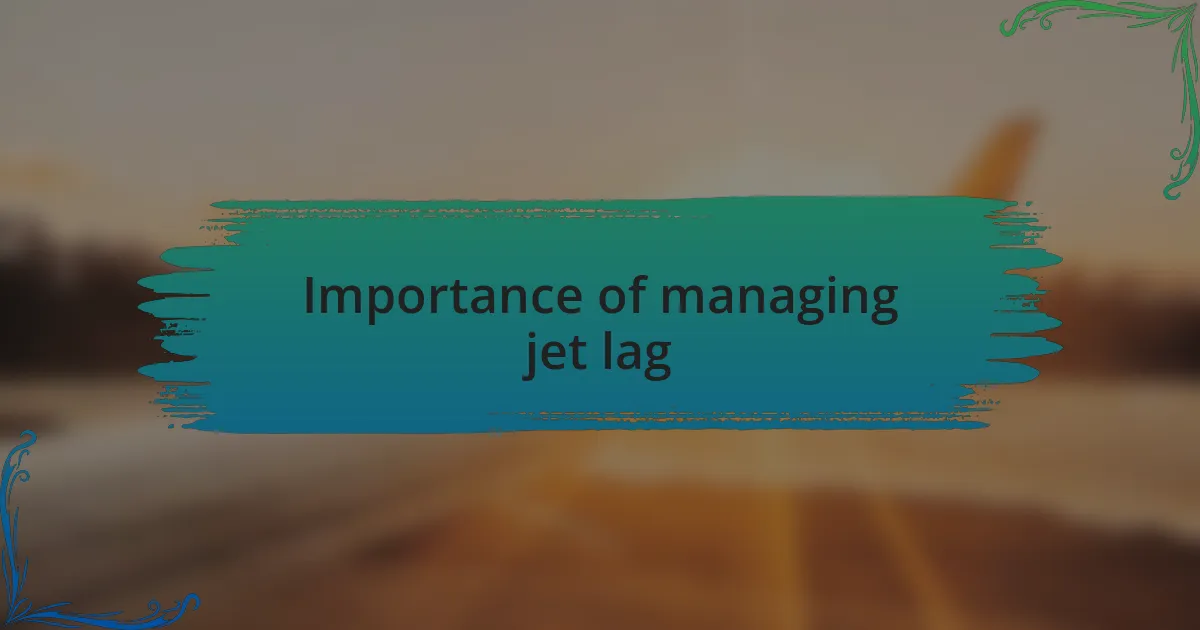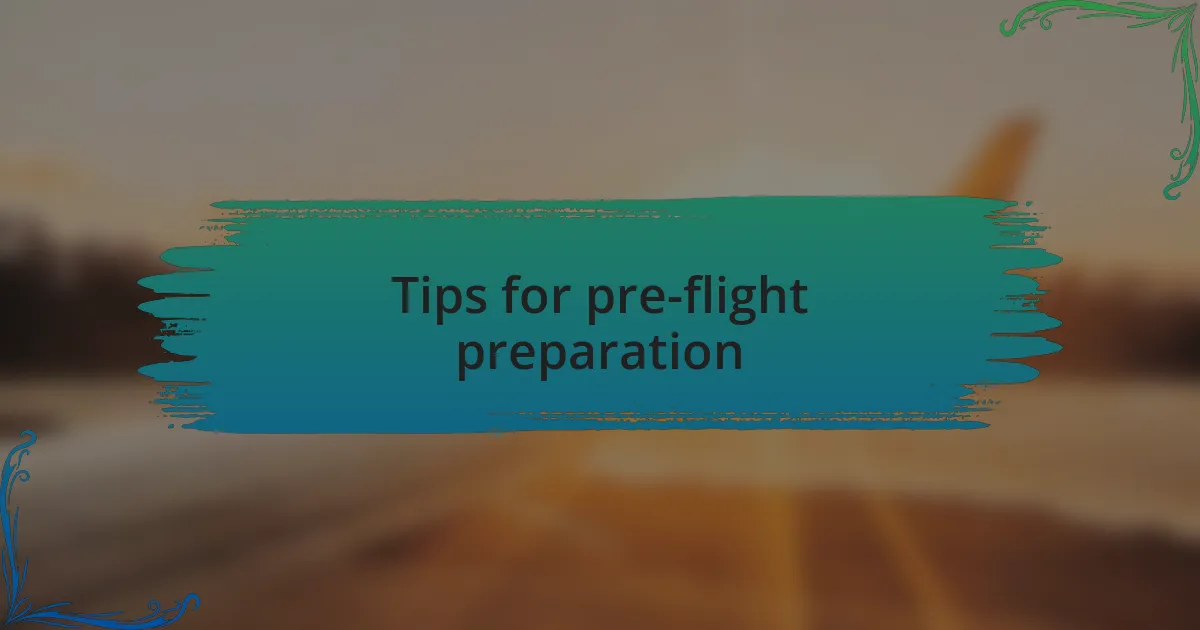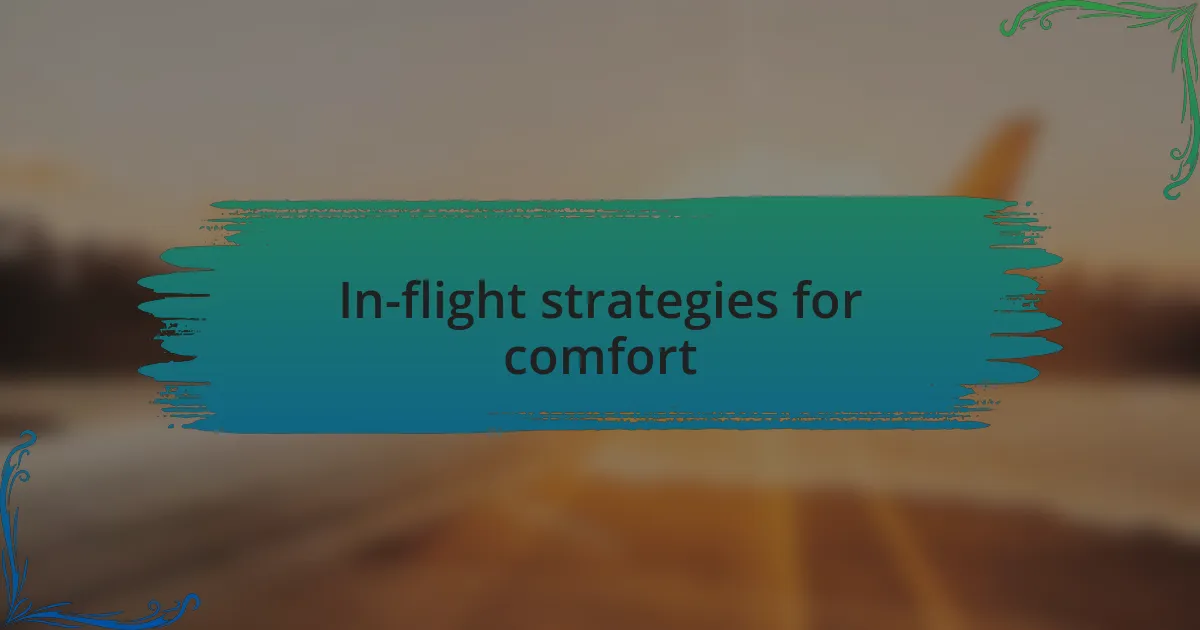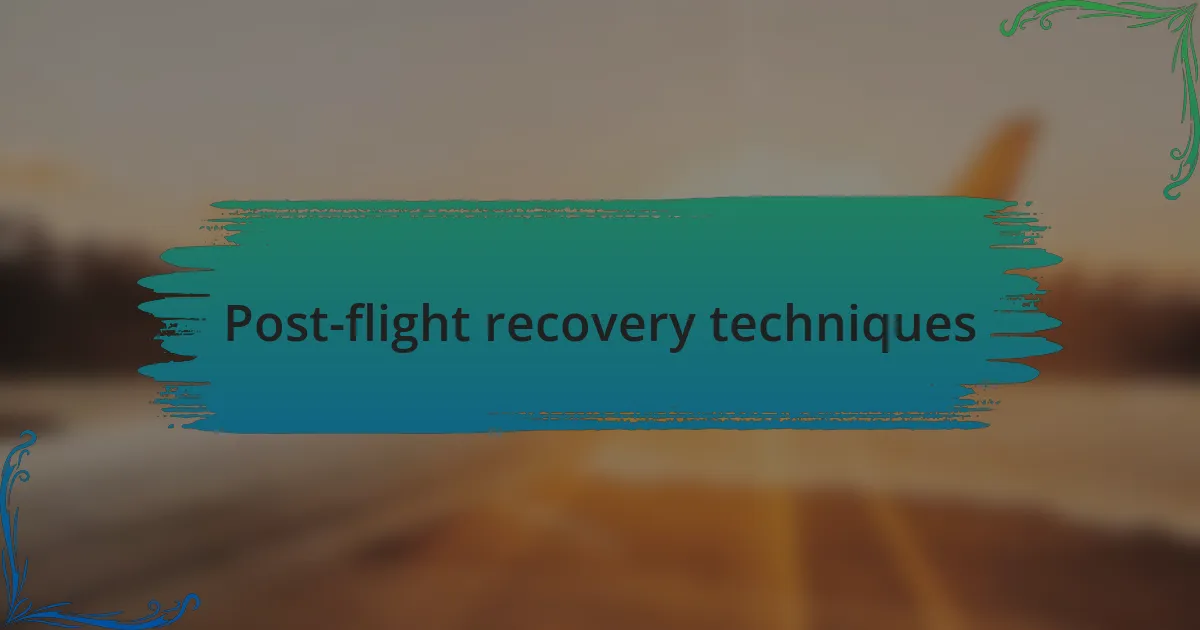Key takeaways:
- Jet lag disrupts circadian rhythms, leading to symptoms like fatigue and irritability, and individual resilience varies based on factors such as hydration and sleep quality.
- Managing jet lag enhances the overall travel experience, mental well-being, and ability to enjoy new adventures through proactive steps like hydration and adjusting sleep schedules.
- In-flight comfort strategies, such as using travel pillows and wearing loose clothing, can significantly improve the flying experience and help with recovery.
- Post-flight recovery techniques like hydration, stretching, and getting sunlight are essential for adjusting to new time zones and regaining energy after travel.

Understanding jet lag effects
Jet lag can truly throw you off balance, making it difficult to function or enjoy your travels. I remember arriving in Bangkok after a long flight and feeling completely out of sync, my body insisting it was still time to sleep while the world buzzed around me. This disorientation stems from our internal clocks, or circadian rhythms, which can be disrupted by crossing multiple time zones.
When you land and feel as though you’re wandering through a fog, it’s frustrating. This is because the brain takes time to adjust to the local time, leading to symptoms like extreme fatigue, irritability, or even digestive issues. Have you ever felt that nagging sensation of wanting to sleep just when you should be exploring? It’s a common struggle, and recognizing these effects is the first step to tackling jet lag.
What I’ve found fascinating is how everyone reacts differently. Some people bounce back quickly, while others may take days to recover. It made me wonder: why does our resilience vary so much? Personal experience shows that factors like hydration, sleep quality before travel, and even stress levels can significantly influence how we experience jet lag. Understanding these nuances helps us prepare better for our adventures!

Importance of managing jet lag
Managing jet lag is crucial, especially when traveling for business or leisure. I’ve had moments where I landed in a new city, keen to explore but found myself dragging my feet instead. The difference between a productive day and a disappointing one often hinges on how well I handled the initial effects of jet lag.
The importance of addressing jet lag goes beyond sleepiness; it impacts our overall travel experience. I vividly recall a trip where jet lag left me grumpy and unmotivated, making it hard to appreciate the beauty of my surroundings. Have you ever visited a stunning site only to feel too exhausted to enjoy it? When we manage jet lag effectively, we not only regain energy but also enhance our ability to create lasting memories.
Moreover, taking proactive steps against jet lag contributes to our mental well-being. I’ve discovered that minor adjustments, like adopting some pre-travel routines or staying well-hydrated, can make a world of difference. Doesn’t it feel great to arrive at your destination feeling refreshed and ready to dive into new adventures? Prioritizing this aspect of travel can transform how we connect with new cultures and experiences.

Tips for pre-flight preparation
I’ve learned that pre-flight preparation is essential for combating jet lag. A few days before traveling, I start adjusting my sleep schedule to match my destination’s time zone. It may feel difficult at first, but I find that shifting my bedtime by just 30 minutes each night gradually eases the transition. Have you ever experienced the struggle of trying to sleep on a plane, only to feel wide awake when the local clock says it’s time for bed? Making that small effort really pays off.
Staying hydrated is another crucial tip I’ve adopted. On my last long-haul flight, I made a conscious effort to drink water throughout the journey instead of indulging in caffeine or alcohol. The difference was noticeable when I landed; I felt more focused and less groggy. Isn’t it surprising how something as simple as hydration can impact our energy levels?
Lastly, I recommend packing snacks rich in protein and fiber to stabilize my blood sugar during the flight. I remember a time when I skipped meals in the airport rush, and the ensuing sugar crash left me feeling lethargic. Having healthy snacks on hand not only helps me feel satisfied but also keeps my energy steady, making a smoother arrival possible. Have you ever considered how your food choices affect your travel experience? They truly can make all the difference.

In-flight strategies for comfort
In-flight comfort is something I prioritize, especially on long-haul journeys. One of my go-to strategies is to bring a travel pillow and a light blanket. I vividly remember a flight where I forgot my neck pillow and felt utterly uncomfortable trying to sleep. With the right support, I can actually doze off, making the flight feel shorter and my arrival much fresher. Have you ever tried to nap without proper neck support? It’s a game-changer when you can lean back in comfort.
Another aspect I find helpful is dress code—comfort is key. I tend to opt for loose-fitting clothes and layers, so I can adjust if the cabin temperature changes. There was this one flight where I wore a fitted outfit, and I ended up feeling trapped and restless. The next time, I embraced soft leggings and a cozy hoodie, which allowed me to stretch and adjust easily. Doesn’t it feel better to relax when your clothes don’t constrict you?
Finally, I always take advantage of the in-flight entertainment options to distract myself during the flight. Watching a movie or catching up on a series helps me relax and forget about any discomfort. On a recent long journey, I lost myself in an engaging story, and the hours seemed to melt away. Have you noticed how captivating content can transform your travel experience? It’s a simple yet effective way to make the time fly.

Post-flight recovery techniques
After landing, I find that hydration is crucial for my post-flight recovery. One time, I stepped off a long-haul flight feeling completely wiped out, and I realized I hadn’t drunk enough water. Now, I make it a point to drink a glass of water as soon as I clear customs. It’s amazing how a simple act can re-energize me. Have you ever noticed how dehydration can affect your mood and energy?
Stretching is another technique that really helps me recover after a flight. I remember a particular arrival where my legs felt stiff and heavy from sitting for so long. Now, I take a few minutes to walk around and do some light stretches as soon as I land. It feels great to loosen up those muscles and get the blood flowing. Have you ever tried stretching in an airport? It might feel a bit odd, but it’s worth it for a quicker recovery.
Lastly, I find that getting plenty of sunlight upon arrival works wonders for resetting my internal clock. I recall stepping outside after a long flight and feeling invigorated by the natural light. It may sound a bit cliché, but being in the sun can really lift my spirits and help me adjust to a new time zone. How about you? Have you found that fresh air and sunlight can change your outlook after traveling?

Personal experiences with Thai Airways
I’ve had several flights with Thai Airways, and each time, I’ve been impressed by the level of service. On one memorable trip, the flight attendant noticed I was feeling uneasy after my meal and took the time to check in on me. That personal touch made a huge difference; it felt like I was cared for rather than just another passenger. Have you ever experienced that kind of genuine service while flying?
The in-flight entertainment options are another highlight of my experience with Thai Airways. On one long-haul journey, I got lost in a captivating documentary that transported me away from the cramped cabin. It made the flight feel shorter, and I arrived feeling more relaxed. Doesn’t it feel great when a good movie can distract you from the travel fatigue?
I also remember a time when I arrived at my destination and found myself chatting with a fellow passenger who was a frequent flyer with Thai Airways. We exchanged stories about our trips, and he shared tips about how to adjust to the time zone. This connection truly made the experience feel more enriching, turning a simple flight into a memorable interaction. Have you ever forged unexpected connections while traveling?